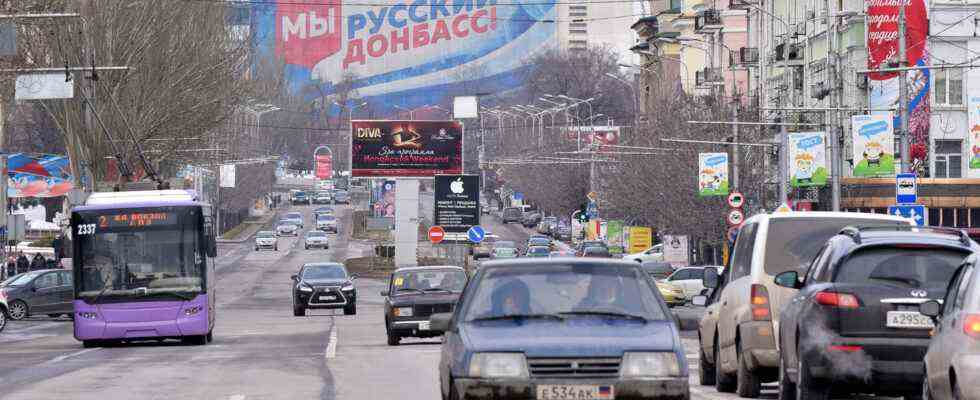Status: 02/09/2022 11:27 a.m
There is hardly any news from the separatist areas in the Ukrainian Donbass – because the population lives in fear. People keep disappearing. Returnees report arbitrary detention and torture.
Ihor Kozlovskyj was just taking out the rubbish when, at the end of January 2016, gunmen simply took it away. The first stop of his almost two-year imprisonment in Donetsk is a dark, ice-cold, windowless cellar. With a sack over his head, he is brought in for interrogation shortly afterwards. “I didn’t see her and the first sentence I heard was, ‘Have you ever been tortured?’ And then they started doing it,” he says. “They took turns beating, electric shocks, cutting off air, hanging up and mock shooting. It was many hours.”
After the torture, his arms and legs are numb and Koslovskyj loses consciousness again and again. The torturers themselves compared themselves to the notorious Soviet secret service of the 1930s. Talking about torture is a mental feat – this calm and friendly-looking religious scholar seems to succeed.
“During interrogations, they read out denunciations by a certain ‘mosquito’,” he reports. The accusations: he, Ihor Anatolyevich Kozlovsky, supported the Maidan protests and brought many great students to a “pro-Ukrainian political position”; he has influence on the people and is an enemy of the self-proclaimed ‘young republic’. “Everyone was tortured, both women and men. They tortured and raped everyone, including the men,” Koslowskyj recalls.
Locked up in cellars, kennels, shafts
His family had already fled Donetsk by then and Kozlovskyj wants to follow them as soon as possible – with his older son, who has a disability and is alone after his father’s kidnapping. “They definitely have a plan: the aim is to eliminate and displace the active minority and intimidate the passive majority,” he says.
Oleksandra Matvichuk also knows this bitter truth from hundreds of conversations with people who were imprisoned by the pro-Kremlin separatists around Donetsk and Lugansk – in basements, warehouses, garages, kennels, shafts, halls, once official prisons or old factory buildings like the isolation prison in Donetsk.
The lawyer heads the Center for Civil Liberties in Kiev, which documents illegal detention, forced labour, torture and killing. She reports of atrocities: Prisoners’ limbs were severed, nailed into wooden boxes, a person’s eye was ripped out with a spoon. It hits civilians most often: “There is no system of how to behave to protect yourself from it: you can worship a portrait of Putin, but at the same time cross the street in front of a car in which the representative of an illegal armed group is driving sits down. And if he doesn’t like it, you go into a basement,” she says.
“Our life is kinda surreal”
The human rights activist reports that people could disappear for three days, three months or three years. Contact with relatives or even a lawyer is not possible. Matwitschuk is often the only point of contact for desperate relatives. In lengthy efforts, she turns to the United Nations, agencies in Russia or the separatists loyal to the Kremlin.
Her phone buzzes: It’s the father of a doctor who has been imprisoned for three years and urgently needs an operation. The operation is not allowed for the time being, but Matvichuk does not give up. “Our lives are kind of surreal,” she says quietly. “I know very well that if a new Russian offensive were to begin, I and my colleagues will be the first victims because we are the active minority that must be physically destroyed or displaced. Because we are capable of non-violent resistance.”
Ihor Koslowskyj estimates that several thousand people have already been or are in captivity. The 68-year-old regrets that they would not get any psychological help if they were free. He himself was released in a prisoner exchange at the end of 2017. At the time, Ukrainian television showed him and others. Everyone stands there, pale and serious, Koslovskyj smiles – even then.
“A person survives such conditions if they see meaning in life,” he says. “When I was brought back to the cell after the first torture and the bag was pulled off my head, I was bleeding and someone asked me, ‘Why are you smiling?’ I couldn’t answer because I was dehydrated after the torture, but inside I thought to myself: firstly, I’m not afraid to die and secondly, I will live because I love my family, loved ones and my country, but that’s not the main thing . Because the most important thing is: you love me.”

